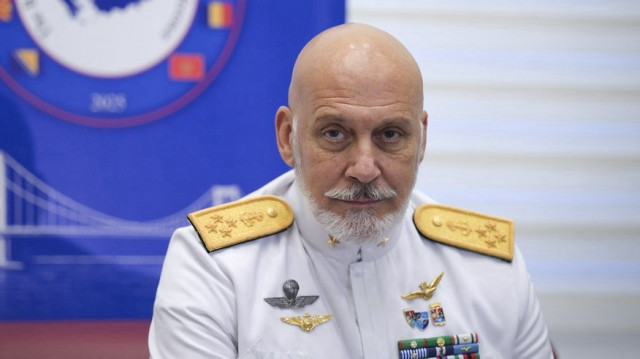
Admiral Giuseppe Cavo Dragone praises Türkiye's strong military capabilities, vital role in NATO missions
Türkiye will be one of the key actors in the peace process between Russia and Ukraine, said NATO Military Committee Chairman Admiral Giuseppe Cavo Dragone on Wednesday.
“Türkiye is doing a lot for the alliance. It is the 2nd Army of the alliance. And so, we cannot disregard this. This means something. And the combat readiness and preparedness, and efficiency of Türkiye armed forces are no doubt at the very top,” Dragone said at a news briefing following the 18th Conference of the Chiefs of Staff of the Balkan Countries, which took place at the Multinational Joint Warfare Center Command in Istanbul.
Emphasizing Türkiye's operational capabilities and contributions to NATO missions, particularly in conflict zones, Dragone described Ankara as “a strong pillar, a strong reference, a strong reliable ally.”
He also underlined that Türkiye is a fundamental element of NATO's overall strategy and has been actively contributing to the Kosovo Force (KFOR), which it will command beginning in October.
So you get the sense of “how important and how strong is Türkiye for us, for the alliance, and how much the alliance relies on Türkiye. That's a matter of fact. And just the K4 example is one of the many,” he added.
“NATO's posture is strong, let me say stronger than ever,” he said, adding that the alliance has two threats, defined as Russia and terrorist groups. “There are not their convenience to attack us. So, the strategy of NATO is being ready.”
“We are increasing it (defense strategy) because we decide that we need to improve it for the present, coming from lesson learned from Ukraine, and maybe for the future to be ready to be up to speed and upgraded for the changing environment, the changing threat, because also the threat we have to admit that will change with time,” Dragone said.
- Türkiye on ‘top' in unmanned aerial vehicles
Türkiye was one of the first in understanding the importance and the growth capability of unmanned aerial vehicles, Dragone said, adding that many lives are likely being saved thanks to UAVs, not only among pilots and aviators but also seamen and soldiers. While not calling it the future outright, he noted that it will be a key element in the evolving nature of the battlefield.
Referring to the success of Turkish UAVs, He said: “Yours are on top. Yours are also combat-proven, which is something meaningful.”
Dragone also highlighted the operational capabilities of UAVs in air, sea, and land operations, noting that their use at sea is both novel and strategically significant.
He stressed that unmanned underwater vehicles are enabling cost-effective patrol, intervention, and deterrence operations under the sea.
As for his expectations from the defense industry, Dragone said the goal should be to meet NATO's operational capabilities and requirements in a timely and cost-efficient manner.
“(Defense industry) they need to change their mind. They need to not look anymore for just money, but they need to be part of the defense system,” he noted.
He added that the “occasion is a great chance to get together all the military leaders of this area,” noting that participants exchanged views at the conference and reached a shared understanding on ensuring the region's security and stability.







